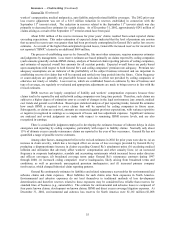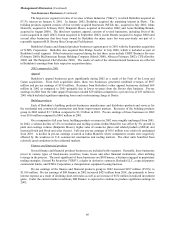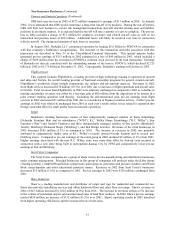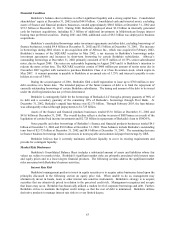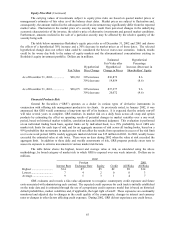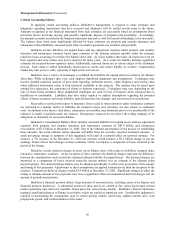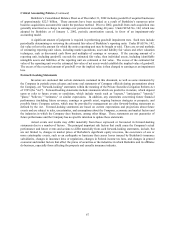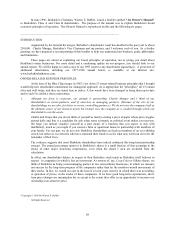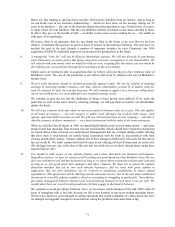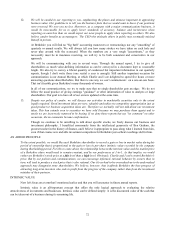Berkshire Hathaway 2002 Annual Report Download - page 63
Download and view the complete annual report
Please find page 63 of the 2002 Berkshire Hathaway annual report below. You can navigate through the pages in the report by either clicking on the pages listed below, or by using the keyword search tool below to find specific information within the annual report.
62
Management's Discussion (Continued)
Non-Insurance Businesses (Continued)
Other businesses
Revenues in 2002 of Berkshire’ s other businesses increased $495 million to $1,983 million and pre-tax
earnings increased $314 million to $691 million. Pre-tax earnings from other businesses include interest on trust
preferred securities issued by MidAmerican Energy as well as Berkshire’ s proportionate share of MidAmerican’ s
net earnings related to Berkshire’ s investments in common and convertible preferred stock of MidAmerican.
Berkshire’ s earnings from these investments totaled $435 million in 2002 and $165 million in 2001. MidAmerican’ s
earnings in 2002 benefited from acquisitions of two natural gas pipelines and acquisitions of three real estate
brokerage businesses. The remainder of the comparative increases in revenues and operating profits was primarily
due to the inclusion of the results of businesses acquired in 2002 from their respective acquisition dates (Albecca—
February 8, 2002, The Pampered Chef and CTB International—both October 31, 2002).
2001 compared to 2000
Revenues from the non-insurance businesses increased $7,725 million (86.8%) in 2001 as compared to
2000. Pre-tax earnings of $2,106 million during 2001 increased $706 million (50.4%) from the comparable 2000
amount. Business acquisitions, principally Shaw and the building products group, which were all completed during
2000 and 2001, account for much of the comparative revenue and earnings increases.
Purchase-Accounting Adjustments
Purchase-accounting adjustments reflect the after-tax effect on net earnings with respect to the amortization
of fair value adjustments to certain assets and liabilities recorded at various business acquisition dates. Prior to
2002, this amount also included the systematic amortization of goodwill.
Effective January 1, 2002, Berkshire ceased amortizing goodwill of previously acquired businesses in
accordance with the provisions of SFAS No. 142. See Note 7 to the Consolidated Financial Statements for
additional information related to this new accounting standard. Purchase-accounting adjustments for 2001 and 2000
included $636 million and $548 million, respectively, of after-tax goodwill amortization. These amounts include
Berkshire’ s share of goodwill amortization charges taken by MidAmerican, with respect to Berkshire’ s investments
accounted for under the equity method.
Other purchase-accounting adjustments consist primarily of the amortization of the excess of market value
over historical cost of fixed maturity investments held by certain businesses at their acquisition dates. Berkshire
included such excess in the cost of the investments and subsequently amortizes it over the remaining lives of the
investments.
Realized Investment Gains
Realized investment gains and losses have been a recurring element in Berkshire’ s net earnings for many
years. Such amounts — recorded when investments are: (1) sold; (2) other-than-temporarily impaired; or (3)
marked-to-market with a corresponding gain or loss included in earnings — may fluctuate significantly from period
to period, resulting in a meaningful effect on reported net earnings. However, the amount of realized gains in a
given period has no practical analytical value, especially given the magnitude of unrealized gains existing in
Berkshire’ s consolidated investment portfolio.
The Consolidated Statements of Earnings include after-tax realized investment gains of $383 million in
2002, $842 million in 2001 and $2,392 million in 2000. In 2002 and 2001, realized investment gains were net of
after-tax losses of $373 million and $161 million related to charges for other-than-temporary impairments.
Management evaluates investments for impairment as of each balance sheet date. Factors considered in determining
whether an impairment charge is warranted include the length of time the unrealized loss has existed, the financial
condition of the investee, future business prospects and creditworthiness of the investee, and Berkshire’ s ability and
intent to hold the investment until the value recovers. When an impairment charge is recorded, the cost of the
investment is written down to fair value through a charge to earnings. Consequently, impairment charges related to
essentially all of Berkshire’ s investments produced no effect on total shareholders’ equity because these investments
were already carried at fair value with the difference between fair value and cost included directly in shareholders’
equity as a component of accumulated other comprehensive income.





